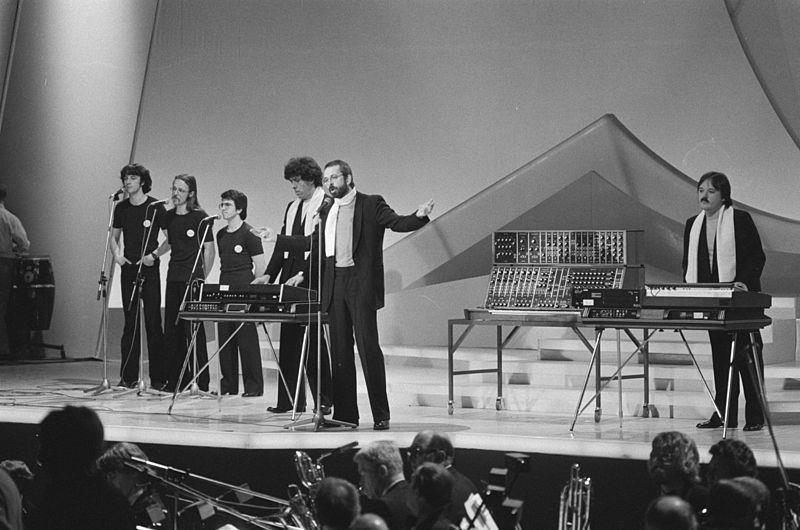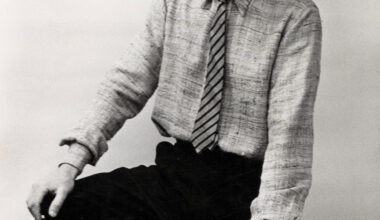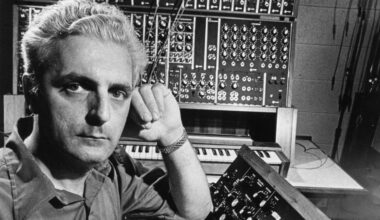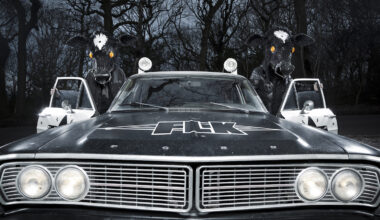We backpedal to 19 April 1980 when leftfield Belgian electronic outfit TELEX took the stage at the Eurovision Song Contest in a bid to bag the legendary musical prize… or failing that, come last with null points

Electronically speaking, when you think of Belgium what springs to mind? Plastic Bertrand of novelty punk hit fame ‘Ca Plane Pour Moi’? The devastating Front 242? The late 80s/early 90s hardcore techno scene? R&S Records? The ever-inventive Soulwax? To the list we should add spiky, conceptual electropoppers Telex, whose finest moment found the trio of Michel Moers, Dan Lacksman and Marc Moulin gracing the stage of the 1980 Eurovision Song Contest with their celebratory ditty ‘Euro-Vision’.
The video of the performance, which took place at the Congresgebouw in The Hague, Netherlands, is something to behold with the band donning tuxedos and twirling their white evening scarves around for comic effect. There’s even a lacklustre confetti shower. But how did the creators of tracks such as ‘Moscow Discow’ and ‘Temporary Chicken’, both insanely bonkers and irresistibly catchy, come to be front and centre at Europe’s kitschest talent show?
“Our record company, RKM, came up with the idea following the great international response to our first album ‘Looking For St Tropez’,” deadpans Telex frontman Michel Moers. “At first, we thought it was a stupid idea. Not our type of music, nor our audience and we didn’t really want to show ourselves on TV, thinking that the music was more important.”
Like the Residents and Daft Punk, Telex rarely appeared performing unmasked, but eventually they relented. “We thought it would be interesting to go,” says Michel. “After all, we were making ‘pop music’ and Eurovision was the epitome of that, plus subverting cliches was something we enjoyed.”
Despite their relatively high profile at home, they still had to compete with nine other bands to bag the slot with a qualifying show on Belgian TV.
“If I remember correctly, it was jointly voted for by a professional jury and the public, 50/50,” adds Michel.
There’s a laconic humour at work in much of Telex’s music, which with its vocodered Euro vocals, analogue synths and metronome rhythms, inevitably recalls Kraftwerk spliced with a touch of Devo perhaps. For evidence, seek out their painfully slowed down version of ‘Rock Around The Clock’ and, for a moment of inspired national self-reference, their cover of the aforementioned ‘Ca Plane Pour Moi.’ The rather snarky ‘Euro-Vision’ is certainly of its time, with its references to the Berlin Wall and the exchange rate of Italian Lira, but what was it all about?
“The song was a kind of ‘international situationism’ I suppose,” explains Michel. “Putting a little worm in an apple. It was about this glittering contest taking place in old Europe, opening borders virtually, if only for a few hours. Musically, we used a few Eurovision cliches, joyful harmonies, getting higher tonally towards the end, a bit of a Beethoven theme…”
While it might have been some 35 years ago, what does Michel remember about the night of the contest itself?
“The evening was a bit of a nightmare,” he offers. “We had no real rehearsals, but there were lots of fraught discussions about hiring backing singers to replace the vocoder, unexpected rules about my flash camera possibly damaging the TV cameras and our machines having to be switched off because of fire safety. And during the performance itself I couldn’t hear my vocals or the backing vocals, so consequently my singing was not at its best.”
And how did their performance and the song itself go down?
“The audience looked as if they were wondering ‘What the hell are these guys doing here?’,” says Michel. “We were wondering the same thing actually. Polite applause came after a few seconds of stunned silence. My favourite memory was speaking to the eventual winner Johnny Logan backstage before the show.
I told him he was going to win. He said, ‘Well, if I win it’s good for me, but if you win, it’s good for music!’.”
Michel’s bandmate, the late Marc Moulin, was quoted as saying that Telex wanted to come last, but were pipped to the post by Portugal, was that true?
“Not quite, but we thought the only meaningful result was to come first… or last,” says Michel. “Our record company actually thought we could win. There were some interesting bets being made in the UK. So before really getting inside the circus we started to believe that winning was a possibility. It was the 25th anniversary of the contest too, change was in the air and it was the first time that the public could vote. But in fact the opposite happened. I think the audience and the judges understood the song quite well and were upset by it, though some people kindly said that we were just too far ahead of our time.”
Telex had been around for a few years before Eurovision and they’d already had some success with ‘Moscow Discow’. Did appearing on Eurovision affect their career at the time?
“It had a very bad impact,” exclaims Michel. “Our fans wondered what we were doing there and we were too strange to reach a new audience… except in Portugal, don’t ask me why.”
Telex ended the night 17th out of 19 entrants with just 14 points, 10 of which – full marks – came from the Portuguese jury.
“The main thing was having fun and being satisfied with the result, for a few days anyway,” concludes Michel. “The funny thing is that our appearance is still remembered and shown every time there is a programme about the contest, and now you’re asking me about it too, so in a way maybe we won.”





